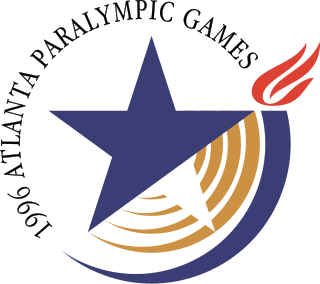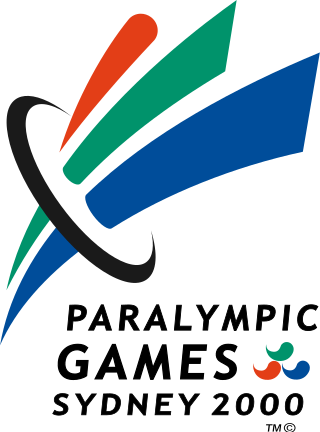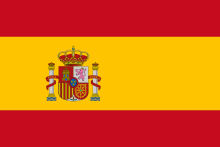
The Paralympic Games or Paralympics, also known as the Games of the Paralympiad, is a periodic series of international multisport events involving athletes with a range of disabilities. There are Winter and Summer Paralympic Games, which since the 1988 Summer Olympics in Seoul, South Korea, are held almost immediately following the respective Olympic Games. All Paralympic Games are governed by the International Paralympic Committee (IPC).

The 1996 Paralympic Games in Atlanta, Georgia, United States, were held from August 16 to 25. It was the first Paralympics to get mass media sponsorship, and had a budget of USD $81 million.

The 2000 Summer Paralympic Games or the XI Summer Paralympics were held in Sydney, New South Wales, Australia, between 18 and 29 October. The Sydney Paralympics was last time that the Summer Paralympics were organized by two different Organizing Committees. In this edition, a record 3,801 athletes from 120 National Paralympic Committees participated in 551 events in 18 sports, and until the 2006 Commonwealth Games held in Melbourne, it was the second largest sporting event ever until that date held in Australia and the Southern Hemisphere. Sydney was the eighth city to host the Olympics and the Paralympics on same venues at the same year, and the first since Barcelona 1992 that they were organized in complete conjunction with the Olympics. They were also the first Paralympic Games outside the Northern Hemisphere and also in Oceania.
Cheating at the Paralympic Games has caused scandals that have significantly changed the way in which the International Paralympic Committee (IPC) manages the events.

Australia was the host nation for the 2000 Summer Paralympics which was held in Sydney. Australia competed in the games between 18 and 29 October. The team consisted of 285 athletes in 18 sports with 148 officials. It was the country's largest ever Paralympic delegation to a Games. Australia has participated at every Summer Paralympic Games since its inception. Australia finished at the top of the medal tally with 63 gold, 39 silver and 47 bronze medals to total 149 medals for the games. This was the first time and the only time to date that Australia has finished on top of either an Olympic or Paralympic medal tally.

The Summer Paralympics, also known as the Games of the Paralympiad, are an international multi-sport event where athletes with physical disabilities compete. This includes athletes with mobility disabilities, amputations, blindness, and cerebral palsy. The Paralympic Games are held every four years, organized by the International Paralympic Committee. Medals are awarded in every event, with gold medals for first place, silver for second and bronze for third, a tradition that the Olympic Games started in 1904.

The Winter Paralympic Games is an international multi-sport event where athletes with physical disabilities compete in snow and ice sports. The event includes athletes with mobility impairments, amputations, blindness, and cerebral palsy. The Winter Paralympic Games are held every four years directly following the Winter Olympic Games and hosted in the same city. The International Paralympic Committee (IPC) oversees the Games. Medals are awarded in each event: with gold for first place, silver for second, and bronze for third, following the tradition that the Olympic Games began in 1904.

The medal table of the 2000 Summer Paralympics ranks the participating National Paralympic Committees (NPCs) by the number of gold medals won by their athletes during the competition. This was the eleventh Summer Paralympic Games, a quadrennial competition open to athletes with physical and intellectual disabilities. The Games were held in Sydney, Australia, from October 18 to October 29, 2000, the first time they had been held in the southern hemisphere. With 3,843 athletes taking part in the 18 sports on the programme, the Games were the second largest sporting event ever held in Australia. The location and facilities were shared with the largest event, the 2000 Summer Olympics, which concluded on 1 October. The Games set records for athlete and country participation, tickets sold, hits to the official Games website, and medals on offer.

Australia has participated officially in every Paralympic Games since its inauguration in 1960 except for the 1976 Winter Paralympics.

The United Arab Emirates started actively participating in the Paralympic community during the 1990s. They made their debut at the 1992 Summer Paralympics. Since that time, they have won several Paralympic medals. The country had their debut on the international Paralympic stage at the 1990 Stoke Mandeville Games. Some of the country's Paralympic competitors are internationally ranked. The United Arab Emirates have competed at several other Paralympic events including the Arab Paralympic Games, Asian Paralympic Games, IWAS World Games, Stoke Mandeville Games, and World Semi-Olympic Championship. The United Arab Emirates Paralympic Committee is the national organisation, gaining its International Paralympic Committee recognition in 1995 and have subsequently made winning medals and hosting events a priority.

France participated in the inaugural Paralympic Games in 1960 in Rome, and has taken part in every edition of the Summer and Winter Paralympics since then. France was the host country of the 1992 Winter Paralympics.

Australia competed at the 2004 Summer Paralympics in Athens, Greece. It was Australia's 12th year of participation at the Paralympics. The team included 151 athletes. Australian competitors won 101 medals to finish fifth in the gold medal table and second on the total medal table. Australia competed in 12 sports and won medals in 8 sports. The Chef de Mission was Paul Bird. The Australian team was smaller than the Sydney Games due to a strict selection policy related to the athletes' potential to win a medal and the International Paralympic Committee's decision to remove events for athletes with an intellectual disability from the Games due to issues of cheating at the Sydney Games. This was due to a cheating scandal with the Spanish intellectually disabled basketball team in the 2000 Summer Paralympics where it was later discovered that only two players actually had intellectual disabilities. The IPC decision resulted in leading Australian athletes such as Siobhan Paton and Lisa Llorens not being able to defend their Paralympic titles. The 2000 summer paralympic games hosted in Sydney Australia proved to be a milestone for the Australian team as they finished first on the medal tally for the first time in history. In comparing Australia's 2000 Paralympic performance and their 2004 performance, it is suggested that having a home advantage might affect performance.
José Antonio Expósito Piñero is a Paralympic athlete from Spain.

Spain competed at the 2000 Summer Paralympics in Sydney, Australia. The team included 210 athletes—158 on foot and 52 wheelchairs. Spanish competitors won 106 medals, 38 gold, 30 silver and 38 bronze, to finish 4th in the medal table.
Para-swimming classification is a function-based classification system designed to allow for fair competition in disability swimming. The classes are prefixed with "S" for freestyle, butterfly and backstroke events, "SB" for breaststroke and "SM" for individual medley events. Swimmers with physical disabilities are divided into ten classes based on their degree of functional disability: S1, S2, S3, S4, S5, S6, S7, S8, S9 and S10. The lower number indicates a greater degree of impairment. Those with visual impairments are placed in three additional classes: S11, S12 and S13. One more class, S14, is reserved for swimmers with intellectual impairment. A final class, S15, is for athletes with hearing loss. Another Classification is S19 Whitch is basically S14. It is different because S14 swimmers have an Iq of below 75 whereas S19 swimmers have an Iq of above 75.

Para-Nordic skiing classification is the classification system for para-Nordic skiing which includes the biathlon and cross-country events. The classifications for Para-Nordic skiing mirrors the classifications for Para-Alpine skiing with some exceptions. A functional mobility and medical classification is in use, with skiers being divided into three groups: standing skiers, sit skiers and visually impaired skiers. International classification is governed by International Paralympic Committee, Nordic Skiing (IPC-NS). Other classification is handled by national bodies. Before the IPC-NS took over classification, a number of organizations handled classification based on the type of disability.
Marie Therese Little OAM was a leading Australian sport administrator particularly in the area of disability sport. She was President of the Australian Paralympic Federation and AUSRAPID.

In 1992, Spain had competitors in archery, wheelchair basketball, swimming, weightlifting, shooting, boccia, cycling, fencing, judo, tennis, 7-per-side football, table tennis and athletics.

The 2014 IPC Athletics European Championships was a track and field competition for athletes with a disability open to International Paralympic Committee (IPC) affiliated countries within Europe, plus Azerbaijan and Israel. It was held in Swansea, Wales and lasted from 18 to 23 August. The competition was staged at Swansea University Stadium. Approximately 550 athletes from 37 countries attended the games.

Nigeria competed at the 1992 Summer Paralympics in Barcelona, Spain, making their Paralympic debut. 6 competitors from Nigeria won 3 medals, all gold, and so finished 33rd the medal table. They competed in athletics, table tennis and powerlifting. Adeoye Ajibola was the country's big success story of these Games, going on to represent Nigeria in non-disability athletics and coming within a second of the men's non-disability 100m world record. Monday Emoghawve was the country's other gold medal winner in Barcelona, claiming gold in men's powerlifting.











